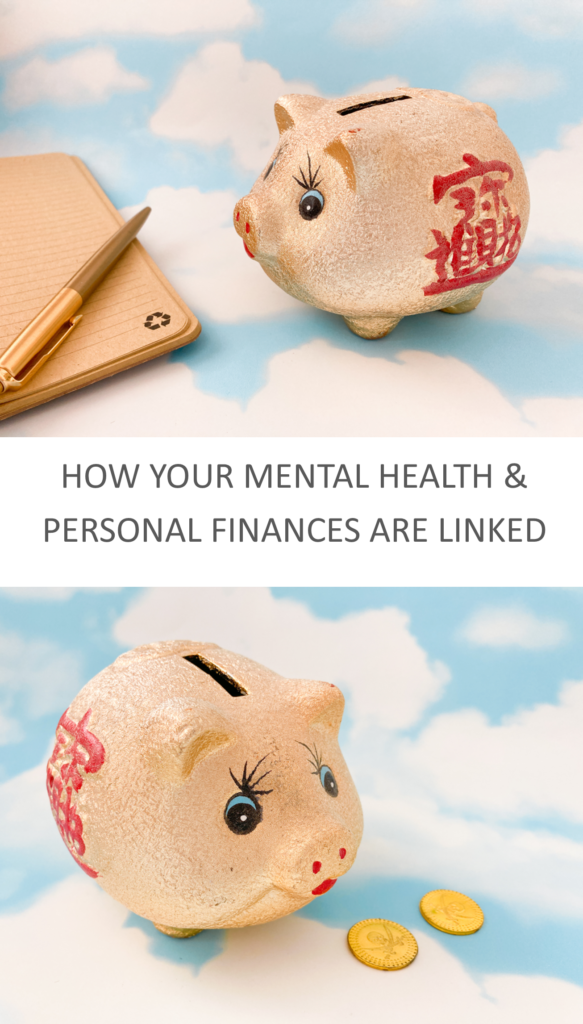We all know that money is essential. It helps pay our bills, buy things we need, care for the people we love, and keep our society functional via businesses and investments. However, we often fail to realise that our personal finances are closely related to our mental wellbeing, too. It can be hard to fully decompress from stress when the cause of it is something so deeply embedded into daily life.

Fortunately, taking some time to understand how money and mental health can affect each other makes it easier to address the anxiety that may arise as a result. Online mental health resources, including this article, can provide further insight, as can working with a mental health professional. So how does mental health affect our finances, and vice versa..?
Well, to start with, our mental health can impact the way we spend, save, and make money. Here are a few key ways that mental health may influence your personal finances:
1. IMPULSIVE FINANCAL DECISIONS
Have you ever felt so low that you needed some retail therapy to make you feel better? Often, when feeling down, people scroll through social media and compare their lives with strangers. You may begin to think that owning a particular bag or dress, or car could bring you happiness. Spending money on things you want but don’t need may give you a momentary “high” or a temporary burst of joy. Still, this impulsivity could also destabilize the budget for the month or even the year. People facing depression or mania, among other mental health symptoms, have a higher tendency to make financially impulsive decisions. I wrote a blog post about alternative things you can do when you get the urge to shop so be sure to check that our.
2. EFFECT ON SOURCES OF INCOME
If you are feeling anxious or depressed, it may affect your ability to concentrate and motivate yourself to study or work. Poor spirits can prevent you from giving your best, resulting in lower levels of achievement or hurting your performance in the workplace. Low energy and procrastination are both factors that’ll make a difference to your ability to work well and you even may not feel able to take on as much work as you usually would.
3. MANAGING FINANCES EFFECTIVELY
Mental illness in general can prevent you from managing your finances – your symptoms may make you feel it is not worthwhile to try budgeting or even plan for future investments. This can be potentially disastrous, especially in difficult situations which may require you to save large amounts of money like home maintenance expenses or tuition fees. If you start dipping into your savings, you might not feel as secure without that ‘safety net’ emergency fund for a rainy day.

HOW FINANCES CAN AFFECT MENTAL WELLBEING
On the flip side, financial concerns can contribute to mental illness themselves. They may also make an individual more likely to develop a mental illness due to certain realities, like inaccessible healthcare, poor diet options, housing instability, and more. Money is often seen as a safety net or a magic wand that can be used to solve all your problems, but living with financial debts can make you feel low, depressed or even vulnerable and anxious.
Financial difficulties can impact on social relationships too. Research indicates that money is one of the most common causes of arguments between couples and financial stress can harm even the most robust relationships. It’s tempting to place the blame on others or feel frustrated when you’re not fully in control of the spending that comes through your account.
In addition, financial troubles can prevent you from spreading your proverbial wings. It could cause you to cut down on your social life – like going to parties or restaurants, which could elevate feelings of loneliness and anxiety. Similarly, you might not be able to do things you’ve dreamed of doing, such as studying, traveling or buying a home if you don’t have the finances available, which can be a cause of despair and depression.

TIPS FOR MANAGING YOUR FINANCES
Once you understand how finances and mental health can be connected, you can begin to evaluate how this dynamic exists in your life and what you can do to address it. Here are some ideas to get you started:
TIP 1: TALK TO SOMEBODY
Talk to your family and trusted friends. They may not be able to offer financial help or fix all your problems, but they can provide support and encouragement. Speaking out can enable you to think of solutions you had not thought of alone. Enlisting the help of others, whether it be loved ones, a mental health professional or someone from the National Debtline advice service, can allow you to plan your finances better in the future and thus improve your mental health.
TIP 2: MAKE AN INVENTORY AND BUDGET
The first step in taking a financial inventory is to identify all the sources of income and expenses. Once you have a good grip on what you owe versus what you make, you can determine how much expendable income you have to use for other things. Look to make small changes and cut down on non-essential or impulsive spending. Try sticking to your plans for the best outcomes – however, don’t be too hard on yourself if they don’t always materialise.

Plus, educating yourself on financial matters will help you feel more in control of your finances – I recently took a course in Personal Money Management but you don’t need to have formal training to feel well informed. You can read ‘Near Future’ reports to find out the current and future effects on the financial market. If you stay up-to-date with the news on UK budgets, interest rates etc – anything that’ll impact your own personal financial situation – you can feel better prepared for your financal future.
TIP 3: TRY TO MANAGE YOUR OVERALL STRESS
An essential component of the planning process should also be dealing with stress, depression or anxiety in general. Even if it’s not related to money yet, it may be eventually. You could practice yoga, breathing exercises, gratitude journals or even muscle relaxation techniques to improve your mental well being. Eating a balanced diet and maintaining a proper sleep schedule can also be helpful.

Remember that anybody could fall prey to financial troubles, so there is no use in blaming or punishing yourself. Nearly everyone struggles financially at some point in their lives. It’s an unfortunate reality of living in an unequal society. Understanding how your mental health may impact (or be impacted by) your finances can help you minimize unnecessary strain caused my money. It can also help you plan more effectively and thoughtfully for the future so you can avoid repeating the same patterns.
Let me know if you’ve got any tips for managing your finances or staying on top of your mental wellbeing in the comments below, it would be wonderful to share some advice on this topic. 🙂
PIN IT FOR LATER

This article is a sponsored collaboration. The pink links in the content indicate a sponsored link or information source. The blog post reflects my own experience and the sponsor hasn’t had any control over my content 🙂























2 responses
Absolutely Rico, thanks for this advice – having a backup fund would certainly ease the stress caused by difficult situations 🙂
My tip is put money into an emergency fund so that when something goes wrong, you have the funds to cover it. Unexpected car or house repair adds mental strain, you should have at least three months of living expenses covered in case of job loss.